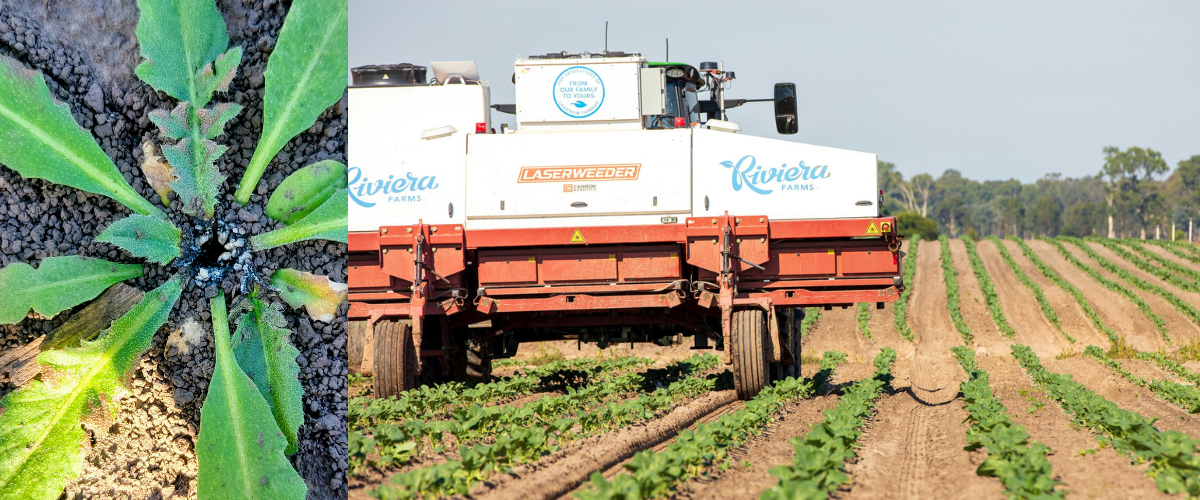
VegNET National Update: 2025 Northern Australia Food Futures Conference
28 May 2025Growing resilience and meeting regional needs
28 May 2025VegNET Gippsland Regional Update
Before investing in the LaserWeeder, Riviera Farms, like many others, struggled with the cost and environmental impact of herbicides. Restrictions were increasing, availability was decreasing, and the need for a long-term, sustainable alternative was becoming urgent. When they first came across Carbon Robotics online, the technology seemed like something from the future. But after attending a live demonstration and speaking with the company that future felt a lot closer.
Carbon Robotics didn’t just make the sale— they backed it up. Within a week of delivery, and with full on-site support from three technicians the machine was set up and running in the field. The Laser Weeder’s user-friendly interface, paired with 24/7 digital support and remote diagnostics through an online portal, made the transition surprisingly smooth.
Mick Cox, production manager at Riviera Farms, has overseen the LaserWeeder’s introduction.
“From day one, we were out there shooting weeds,” Mick said. “It hasn’t stopped since—weather permitting.”
The Carbon Robotics LaserWeeder is a purpose-built, AI-powered machine that uses advanced computer vision with 42 cameras in total and 30 x 150W industrial-grade CO2 lasers to detect and destroy weeds with sub-millimetre precision— without disturbing the soil or harming nearby crops. Its robust design handles long hours, working between 60 to 70 hours per week during peak planting seasons and about 30 hours during the quieter months. The machine also enables weeding in all manner of conditions whether it be dark, windy, or damp; and 24/7 when other means won’t allow weeding.
In a region known for its variable weather, concerns around soil compaction and machine reliability were natural. However, Mick reports minimal issues. The machine’s size and weight are manageable, and when wet conditions arise, Riviera Farms simply pause its operation when required to limit impact on fields. Wear-and-tear on components like bearings and cameras has been expected, but with the subscription service model, replacements and on-site repairs are fast and included.
The results have been profound. Within just four months, the farm has already eliminated the use of two herbicides entirely, with more on the chopping block. The reduced chemical use hasn’t just saved money—it’s improved crop health. Without the stress of chemical exposure, young seedlings are thriving. This has even led to an unexpected 1–2 percent increase in yield—an outcome that hadn’t been anticipated so soon.
Soil health improvements are expected to follow, with fewer chemical inputs likely to benefit the microbiome and long-term fertility. For now, the most visible changes are in the plants themselves: stronger, more resilient crops that require less intervention.
Perhaps most significantly, the laser weeder has changed the way this grower thinks about technology on the farm. Initially sceptical about agtech, the success of the LaserWeeder has opened the door to exploring new tools, ideas and innovation, such as drone spraying.
According to Mick Cox, the LaserWeeder has been pivotal in the battle against weeds.
“There’s no question—we’d buy it again,” Mick said. “It’s changed the way we farm.”
“Ten years ago, I was out there hoeing weeds by hand. If someone had told me we’d be zapping them with lasers, I would’ve laughed.”
Now, neighbours stop by just to see the machine in action. With planting happening 52 weeks a year on this farm, the LaserWeeder isn’t just a novelty— it’s become essential.
The technology performs as promised, but consistent use and early weed targeting are key to maximising ROI.
The Carbon Robotics LaserWeeder offers more than precision—it offers peace of mind. Fewer chemicals, healthier crops, and a step into a more sustainable, high-tech future.

